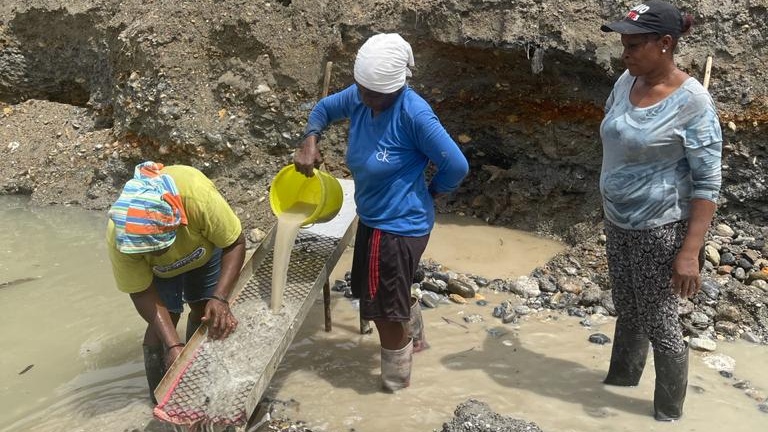Margarita Hurtado is one of about 4,000 barequeras and barequeros (gold panners) in the town of Itsmina in the department of Chocó in western Colombia. Chocó has a diverse geography, unique ecosystems and unexploited natural resources, but its inhabitants have one of the lowest standards of living in Colombia.
For the local population, mostly indigenous people and Afro-Colombians (descendants of enslaved Africans brought to the area by the Spanish colonizers), the artisanal and small-scale gold mining sector is the second most important economic activity, after subsistence agriculture. It is the main source of income for a significant percentage of the population. According to 2019 figures, gold mining in Chocó accounted for 12% of the department's gross domestic product; however, it is a precarious and unsustainable practice.
Small-scale gold mining suffers from mismanagement of resources, a lack of adequate infrastructure and technical capacities (resulting in low gold recovery), and from the volatility of international market prices, and is negatively affected by weak local institutions. Ongoing mining practices in the region damage the environment in the form of deforestation and water pollution, and the burning of mercury to recover minute pieces of gold mixed in sand and sediments damages the nervous, digestive and immune systems of those who inhale the vapor.
In Colombia, the gold mining industry has typically employed men, with women's participation extremely low, reaching only 5% of the total. But in Chocó, where artisanal gold mining has taken place for centuries, women have a significantly higher participation rate, in some areas making up as much as 30% of the workforce. They have traditionally been involved as barequeras (those who wash the sand, a technique known as gold panning) or performing complementary activities, such as cooking and cleaning at the mining sites.

Margarita Hurtado has worked as a barequera in Itsmina since she was very young.
"I get up at 6am and come to the mine to pan. In a day, I can collect three or four grains - which are equivalent to less than one gram. I have been doing this almost since I was born. I do this to survive. This is my work, this is my food and this is how I do my things," explains Hurtado, who lives with her husband and siblings.
Hurtado is part of a United Nations Industrial Development Organization (UNIDO) and European Union project that seeks to empower community councils and communities in Chocó.
Together with the Itsmina Community Council, the project works to strengthen technical capacities and expertise in mining extraction, develop alternative productive projects to mining, and strengthen decision-making capacities. Specifically, the project seeks to train women and support them in empowerment processes to strengthen their leadership role in the artisanal gold mining sector.
The project aims to support and promote the development of productive, legal and sustainable mining that is in line with environmental conservation, promotes territorial peace-building, and improves gender equity practices among the population.
Further reading:
Women's Voices: Female Empowerment for a Mercury-free Colombia






